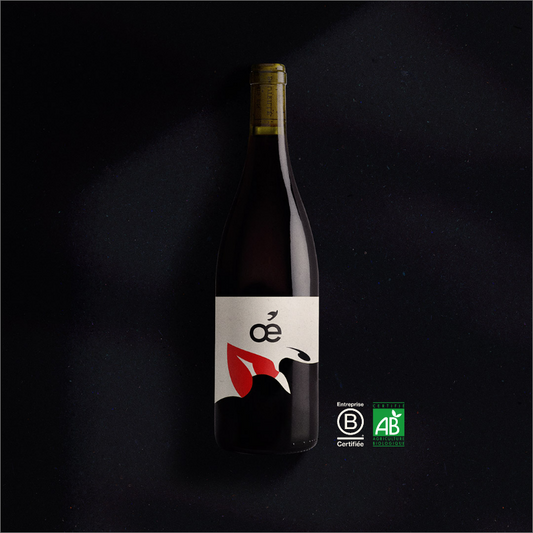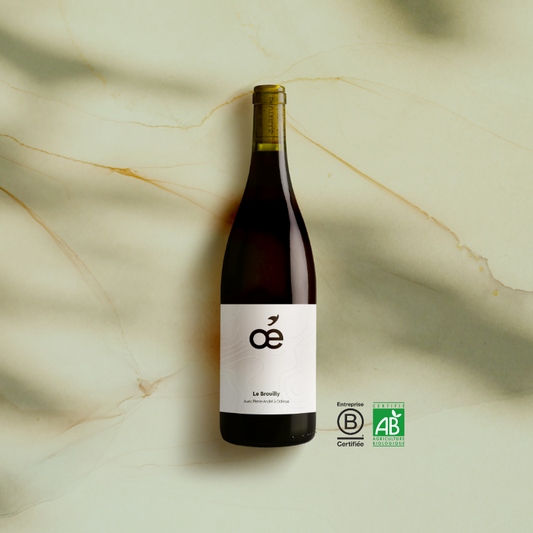How to store an opened bottle of organic wine?
The dilemma between white wine and red wine can easily turn sour. Time to weigh the pros and cons of each of these wines, we will explain how to keep a bottle of organic wine that has been opened so that it does not turn sour either;)
Why take precautions to store my opened bottle?
Nothing new under the sun, with time things deteriorate. In life, nothing is fixed and there are always exchanges that we see or not with the naked eye. A well-known example, rust. Yes, over time, the air oxidizes the metal and this chemical transformation causes rust. For wine, the principle is similar, in contact with air, oxidation occurs which changes the taste of the wine . When the wine is bottled, air is trapped between the wine and the cork which leads to an exchange between the wine and the air but in a fairly reduced and controlled way. For wines for laying down, for example, we look for this evolution of the wine and the winegrowers use oak barrels to age the wine and let a little air through to promote oxidation. When your bottle is started, the air escapes and another air replaces it, which again recreates a lot of exchanges and therefore a transformation of the wine. Excessive oxidation denatures your wine until it turns sour.
Other factors can cause your wine to evolve, even turn sour. It's well known in the world of painting, you have to be careful not to leave your paintings exposed to light for too long at the risk of losing pigments and damaging it. For wine too, we will prefer to keep it away from light and keep it at a temperature below 15 degrees.
What wines can I keep?
Today preservatives are in vogue in the food industry at the risk of distorting the product. Wines with labels and controlled appellations are monitored to respect the doses of authorized inputs .
Sulphur , naturally present in wine, helps preserve wine. The winegrowers can add to the vinification to promote the conservation of the wine provided that they respect the specifications imposed on them.
Authorized sulfite levels are higher for conventional wines, then organic wines , then biodynamic wines and finally natural wines . Only HEALTHY natural wines (Without any input or added sulfites) are free of added sulfites . Wines without sulfur at all do not exist because sulfur is present naturally on the skin of the grape.
In organic farming and biodynamics , the vines and the terroir are treated with particular attention. In harmony with nature, the grapes grow at the rhythm of nature without being disturbed by chemical pesticides. In the continuity of this approach, we put very few inputs on organic wines , which sometimes makes them wines that keep for less time. Naturally, wine is transformed and in organic viticulture , we choose to let nature express itself. A sulfur-free biodynamic wine can keep better than a conventional wine even if it has fewer preservatives because it has been vinified with more care and precaution. The quality of the wine and the bottle play an important role in its preservation .
Where should I keep my opened bottle of organic wine?
The opened bottle must be pampered, it needs a suitable place so that it continues to give you as much pleasure during the second tasting . So to keep its aromas and fresh notes, here are some tips .
Keep my organic wine in the cellar
In this article , we explain how to build your first organic wine cellar , your cellar book and become a real sommelier in your home. The cellar is very useful for storing bottles and also for keeping them.
Dark and barely humid , it is an ideal place to store wine because the temperature is cool and there is very little light . To tell you the truth, taking refuge in your cellar in summer when it's too hot outside is very pleasant. It is a quiet place , ideal for cooling off and taking the opportunity to uncork a bottle at temperature . All the reasons are good to go to the cellar and breathe a breath of fresh air. You may find smells of old wood, a slight humidity and a hint of wine.
For optimal preservation , avoid heat sources and lights that emit ultraviolet rays . A wine that is exposed to light is likely to develop smells of cooked cauliflower or wet wool, not the most pleasant we grant you, and we then speak of taste of light . Some purists light their cellars only with candles, and for a time, sodium lamps were also in vogue but represented a big risk (ignition). Currently, it is the monochromatic LED that seems best suited for an organic cellar . And for that, we advise you to check with your favorite DIY stores;)
Store my organic wine in the fridge
The fridge has become essential to our homes since the postwar boom . Before, we had several techniques to preserve food such as salt bins or ice cream cellars.
The door of your refrigerator is an ideal place to keep your wine at a constant and low temperature before opening it again for tasting. The sweeter the wine, the longer it can be kept because sugar has a very good storage capacity. Have you noticed that your honey is imperishable?
A good sweet white wine can easily stay a week in the fridge , while wine in general can be kept for two to three days. The acidity of the wine also determines its aging potential, the higher it is, the longer the wine can be kept.
For the record, today we commonly use the word fridge to talk about a fridge , well know that it is the name of an American brand created by General Motors in 1918. As when we talk about a t a Kleenex or a Sopalin, we actually use the name of a brand to designate the object.
How do I store my opened bottle of organic wine?
Special caps
The cork is a must in wine. Moreover, we tell you about it in this article . We are also very proud to tell you that at Oé, the stoppers are made from natural cork from FSC carbon negative forests.
The cork stopper is perfect for storing your wines before opening, however, once uncorked it is a bit complicated to put it back. There is a clever technique which consists in putting it upside down, it is up to you to follow it or not. Some say it's not very hygienic, others say it doesn't matter, the choice is yours!.
To preserve your wine once opened, it is possible to limit the exchanges with the air as much as possible. The most affordable and effective technique for an individual is the vacuum pump plug . Unlike a bicycle pump to inflate the tire with air, we come here to pump to suck the air contained in the bottle . In addition to being fun, the result is satisfactory and allows good conservation . Be careful that your cork is in good condition and that the hermetic closure is not damaged.
Professionals need to perform bottle reconditioning more often, and they use fairly expensive machines that allow them to completely empty the air . It is effective but quite expensive, just like another technique which consists in injecting a neutral natural gas (often nitrogen) under overpressure into the bottle to create a barrier between the wine and the oxygen and thus prevent oxidation. . It's very scientific but it's not so complicated after all and then it will give you a Jimmy Neutron side!
The tips and tricks
In your cellar you can store your wine horizontally and not move the bottles . In addition to the practical aspect of horizontal storage , the cork remains moist and thus avoids the passage of air which leads to oxidation of the wine.
If your bottle is already open , the rule changes. Maintaining it vertically makes it possible to reduce the exchange surface with the air and therefore to limit oxidation. Do the test by taking a half-filled bottle , tilt it horizontally and you will see that a large part of your wine will be in contact with the air. Compare this surface to the one in contact with the air when you put it upright and voila!
In addition to that, once opened, the cork has more risk of escaping so if you lay it down, you risk disaster (yes, yes, we are talking about experience...).
After having tasted half of your good bottle of organic wine , your wine shares the space with a lot more air. So if you want to please him, transfer it to a smaller bottle , suitable for what you have left to enjoy.
A choice of wines adapted to the situation can also help you to preserve them better.
Organic wines for laying down are, as their name suggests, made to be kept for a long time and tasted once they have reached maturity. These wines have a good resistance to aging before opening, on the other hand, they bear much less storage once they have been opened because their alcohol and sulphite levels are lower. So if you know you won't finish the bottle , you can turn to young wines that you can keep later. In any case, if you uncork a Grand Cru Classé and you don't finish it, don't wait too long before tasting it again so that it keeps all its flavors or don't hesitate to cook your leftover wine for quality sauce dishes.
Discover more information about the Grands Crus in this article
Discover our range of red wines, white wines and rosé wines to make you happy. Let yourself be surprised by our organic wines Côtes-du-Rhône , Languedoc , Bordeaux , Vaucluse Principality of Orange and Mediterranean from Provence .








